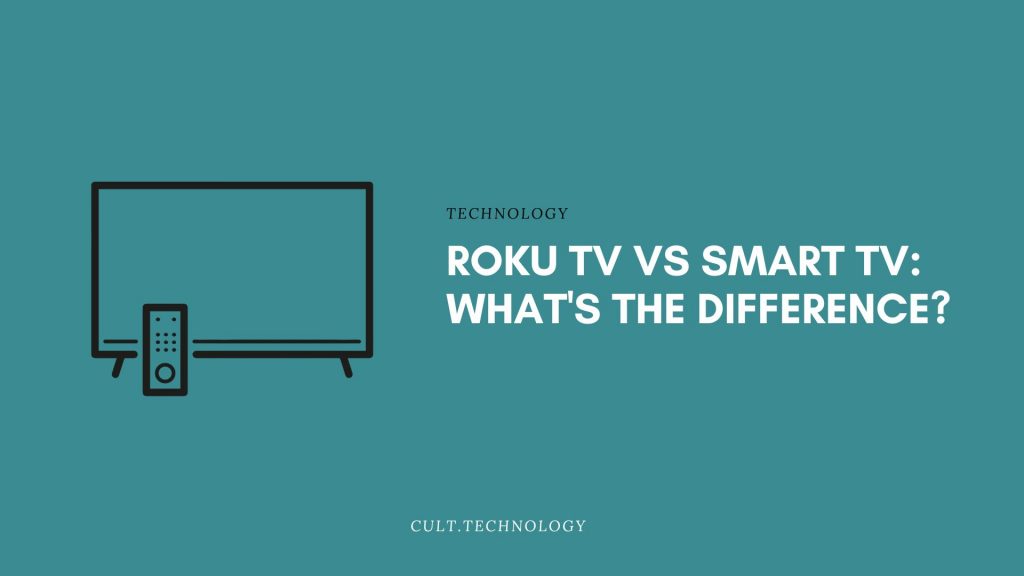It’s 2022, and you have decided to cut off your cable TV connection and move into the world of smart TVs and streaming devices. Due to the influx and the growing popularity of these new techs, the rate of people switching over to these is increasing subsequently. But it isn’t easy to switch when you have got a couple of options in your hand. There are two types of TVs dominating the market these days, Smart TV vs. Roku TV.
Smart TV is the one that has the ability to initiate an internet connection itself while on the other hand, the Roku is a device that gets connected to your traditional or a smart TV via HDMI and gets them connected to the internet. That’s the basic difference between the Smart TV and the Roku TV.
In this article, we are going to cover all the features of both the Smart TV and the Roku TV, and a detailed comparison between both of these that can help you make up your mind to get any of these.
What is a smart TV?
Smart TV is one that is automatically linked to the internet and supports various streaming platforms. This indeed changes the entire definition of TVs as traditionally considered. It has a CPU of its own, an Operating System (OS), pre-installed apps, and Internet-accessible app stores.
What is a Roku TV?
Roku is a device that transforms any traditional TV into a smart TV by connecting it to the internet. All you need to do is connect the Roku to your TV via the HDMI port and it gets connected to the internet. Just in case your TV doesn’t have an HDMI port too (you seriously need to switch to a new one now) Roku also offers its own streaming platform analogue log Audio-Visual connectivity.

Smart TV vs Roku TV: Which one to Choose?
When it comes to choosing Roku TV or Smart TV that works best for you, there are different factors you need to consider. Here are those important things and the difference between Roku and Smart TVs.
1. Hardware
TV companies are too cautious about their brand image. For this, they try to build up a product with the best features. It is not necessary that every product will be the same rather the more you pay the better you receive.
Smart TV companies focus on a couple of things in this segment
- The higher-end models come with powerful hardware and a fluent OS which ultimately reduces the lag.
- The experience they will provide will be top-notch and you’ll enjoy streaming shows or movies in a better resolution.
On the other hand, the difference between the Roku TV and Smart TV is Roku TV only adds up a streaming feature to your TV but it cannot change the hardware or the processor used or make the TV lag-free or smooth as compared to the new end TVs. The traditional TV owner uses various ways to cut down the cost like
- Using low-end processors and cheap hardware systems to make it economical in price rather than the high-end variants of expensive models that make it quite annoying for the Roku TV user because the experience they receive is not as great as compared to the Smart TVs.
- Using a Limited Controlled Remote.
2. Price
It’s kind of obvious that the price point will obviously vary in this case. When you purchase a smart TV you get an entire TV with streaming subscriptions along with it. You pay the price for the entire model which includes the entire hardware for the TV thus making it expensive. You are changing the entire setup and upgrading to a new system. You are ultimately paying the price for the entire system installed.
When you compared it to the Roku TV all you need to do is get a device installed on your old television. A device that just enables internet facilities to your television making it quite obvious why you are paying less for your Roku. The most expensive Roku will still be cheaper if compared to the low-end Smart TVs. That’s where the whole difference lies: if a newer version of Roku comes you can easily change it with your older model but you have to think twice before getting a new smart TV.
3. Portable
Ha-ha, this gets funnier in this segment. You can carry your Roku in a school bag or a handbag and carry it anywhere around the globe without any hassle. How can you do that with your Smart TV?
Smart TVs are quite fragile; one wrong step and you bear a heavy loss. Rather you would never try to attempt this task and if you do obviously be cautious and take the help of your friend or a family member to assist you with it. But what about the Roku? It is quite simple. Just plug out the device from your television and pack it in its box (if available) or even in your pants (not for tight jeans perhaps)
You can take your Roku anywhere along with you and change any TV into a smart TV instantly.
- Whether you are on a trip and your hotel room doesn’t have a smart TV, worry not, just plug your Roku and enjoy its benefits.
- if you want to test your Roku’s performance on your friend’s new TV, you can carry that to your friend’s house and do that too.
4. Streaming Service Support
As observed after the research, the Apps developed for the Smart TVs are not as advanced as compared to the Roku. Big Tech Giants invest their time and money in making apps that are user-friendly for people using Roku Devices or other such devices in the market. Thus the OS they make is also better compared to the Smart TVs somehow. If you get a Smart TV of a lower variant the brand wouldn’t be that great as compared to the higher-end models and that differentiates the user experience.
As a result, while utilizing native TV OS programs, smart TV users frequently run into problems. In other words, streaming applications for built-in OSes are more prone than Roku OS apps to stop at random, become unresponsive without cause or warning, and so on.
The companies which built their apps for devices like Roku are focused on a single thing and thus they make proper utilization of their resources to make the experience better while the Smart TV manufacturing companies try to make an entire TV thus leaving out certain things like OS and that’s how it affects the user experience later.
5. Display
This is the segment in which the Smart TVs Dominate over the Roku TVs.
Smart TV manufacturers try to build a complete model with expensive hardware used. Thus with the price point, they keep
- They provide a better display to their customers and enhance the user experience.
- There are various models like LED, OLED, or AMOLED and once you get used to these displays you won’t be satisfied with any other display models available.
While the difference here is the Roku devices can provide you with different streaming options ranging from HD to 4Kfps but if your Television doesn’t support these there’s no use for these features. There will always be a drawback of Roku in this area.
- When 4K appeared on Roku TVs, they missed the display technology seen on other 4K TVs.
- They lacked larger colour gamuts as well as HDR.
However, these picture-enhancing features are supported by the newest Roku 4K televisions. They are compatible with both HDR10 and Dolby Vision.
6. Upgrade to a new-end model
As mentioned earlier, upgrading to a new end model is always convenient in the case of Roku. The Higher-end models of Roku costs around $30 and these are even much cheaper than the lower-end model of a smart TV. In the case of Smart TVs, although the televisions are still functional, they are no longer cutting-edge items. The temptation to upgrade to a newer smart TV when your current one begins to show symptoms of wear and tear.
The fact that manufacturers do not update all of their TVs contributes to the lower lifespan of smart TVs. Existing models or models from a previous generation are more likely to receive new features and functions. Smart TVs that were introduced more than a few years ago are likely to be ignored.
Roku devices, on the other hand, have longer battery life. They do not last permanently, but they do last for a long time.
To summarise, if the advantages of Roku over smart TVs seem considerable to you, purchasing a Roku is undoubtedly the right decision whether you’re switching to a new TV or keeping your current one.
| Basis | Smart TV | Roku TV |
| Hardware | Better hardware components | Low-end hardware |
| Price range | Always expensive as compared to Roku TV | Economical and Budget Friendly |
| Portability | Inconvenient | Very Convenient |
| Streaming Service Support | Not as smooth and organized | User friendly and easy-to-use |
| Display | Great Display Resolution | Depends on the TV’s adaptability |
| Upgrade | Not that easy because of the price | Can be upgradable without any hassle |
Conclusion
These were a couple of things that showed the difference between the Smart TVs and the Roku TVs. You can see that both of the models had their advantages and drawbacks at the same time.
While being more expensive than Roku, the Smart TV provides better display resolutions and lag-free OS while on the other hand, the Roku is cheap and compatible and can be used in any television model of your choice.
You need to understand your own requirements and make the purchase accordingly. If you feel that it’s time to cope with the generational range and have a model which looks classy and expensive simultaneously you can go for the Smart TVs while if you want to stay within a budget and don’t wants to spend much but still enjoy the new end features you can go for the Roku, it is also a good choice.



